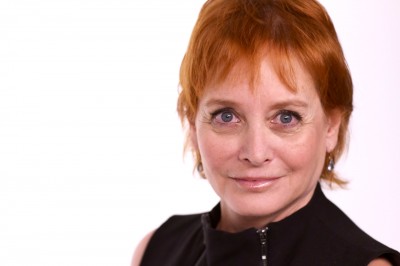NSU Newsroom
SharkBytes
Horizons
This version of NSU News has been archived as of February 28, 2019. To search through archived articles, visit nova.edu/search. To access the new version of NSU News, visit news.nova.edu.
This version of SharkBytes has been archived as of February 28, 2019. To search through archived articles, visit nova.edu/search. To access the new version of SharkBytes, visit sharkbytes.nova.edu.
NSU Alumni Spotlight: Psychology Alumna Recognized for Pioneering Work in Treatment of Self-Injury
Operating a residential treatment center on a horse farm—where patients seeking help for addiction are paired with rescue horses as part of an equine therapy program—is only the latest challenge for NSU alumna Wendy Lader, Ph.D. (’84).
Lader, who earned her doctoral degree from the College of Psychology, has tackled challenges for more than 30 years as a therapist, researcher, program director, author, lecturer, and a pioneer and internationally recognized expert in the treatment of self-injury.
She was recently honored by the college with a 2015 Distinguished Alumni Achievement Award.
Lader is a founding member of the International Society for the Study of Self-Injury, and co-author of Bodily Harm: The Breakthrough Healing Program for Self-Injurers, considered to be a seminal book on the subject.
In 1986, she co-founded S.A.F.E. (Self Abuse Finally Ends) Alternatives®, a national treatment, education, and referral center for self-injury that has been featured on television programs and networks such as Dateline NBC, 20/20, ABC World News Tonight, CNN, Good Morning America, The Today Show, Dr. Drew, and CAPA TV (Paris). She is frequently cited as an expert by media including The New York Times Magazine, The Chicago Tribune, Newsweek, Time, and U.S. News and World Report.
Now, Lader is reaching for a new goal as CEO of Mending Fences, a treatment center on a 400-acre horse farm near Ocala, Florida, where equine therapy will be the program’s core focus in treating addiction and co-occurring disorders.
Lader developed the program with Robert Miller, a family friend who owns the farm and whose vision was to develop a comprehensive program combining equine therapy with vocational assessment and job skills training. The latter was to “offer hope to those clients who may have lost a job or not been able to find a job that offered a sense of purpose,” said Lader, who expects to open Mending Fences by early 2016. The program will be supervised by equine-assisted therapist Marilyn Sokolof, Ph.D.
“I am very excited about this project, as I was given the ability to develop my ‘dream’ residential program for dual-diagnosis clients,” Lader said. “I’ve lectured extensively on self-injury for the past 30 years and have always been told that our treatment program could be utilized for substance abuse as well. I completely agree. I consider self-injury a process addiction so developing the Mending Fences program was not a stretch.”
It was at NSU in the early 1980s where Lader developed an interest in women’s studies and treating women, particularly survivors of rape and domestic violence. While living in South Florida, she worked as a therapist at NSU’s Children’s Assessment and Treatment Center and as a volunteer crisis counselor for the Sexual Assault Treatment Center in Fort Lauderdale. She later moved to Chicago where her husband had accepted a job, but continued to work on her dissertation for her doctoral program at NSU.
“I decided that I wanted to focus my dissertation on domestic violence,” Lader said. “I was fortunate enough to find an expert faculty member at NSU, Maryann Dutton, Ph.D., [who founded a domestic violence treatment center at NSU’s Community Health Center] to serve as my dissertation chair.”
After completing her dissertation, Lader accepted a job at Hartgrove Hospital in Chicago where she opened the first in-patient treatment program exclusively for women. Oprah Winfrey was the keynote speaker at the opening, she said.
“After opening the women’s program at Hartgrove Hospital, our medical director introduced me to Karen Conterio, who was running a group for people who engaged in self-injurious behavior and that had garnered the attention of the Chicago Tribune and The Phil Donahue Show.”
Soon after, Lader and Conterio developed the Women’s Program for the Treatment of Self-Injury at Hartgrove Hospital. “The program was comprehensive and turned out to be very successful in treating a group of clients who were [then] considered to be difficult, if not impossible to treat,” Lader said.
Lader also served as clinical director of the S.A.F.E. Alternatives program she co-founded and owns. “Being instrumental in the creation of S.A.F.E. Alternatives has been the most important project of my career,” Lader said, also citing the publishing of her book. “That project led me to become a co-founder of the International Society for the Study of Self-Injury and a co-founder and executive director of the Self-Injury Foundation.
“My success in that arena gave me the opportunity to develop Mending Fences, which we hope will offer clients a beautiful and tranquil environment in which to recover, and one of the most comprehensive programs available anywhere.”
Recalling her training at NSU, Lader said the doctoral program was “extremely focused on the statistical skills needed for research. This focus gave me the ability to think critically and to analyze the research available. I wish I had paid even more attention as I now realize how invaluable research is to our understanding of the work we do.
Adding to that, “I’ve learned so much through the research of my colleagues, some of which has corroborated my clinical experience and some of it challenged what I thought I knew.”
